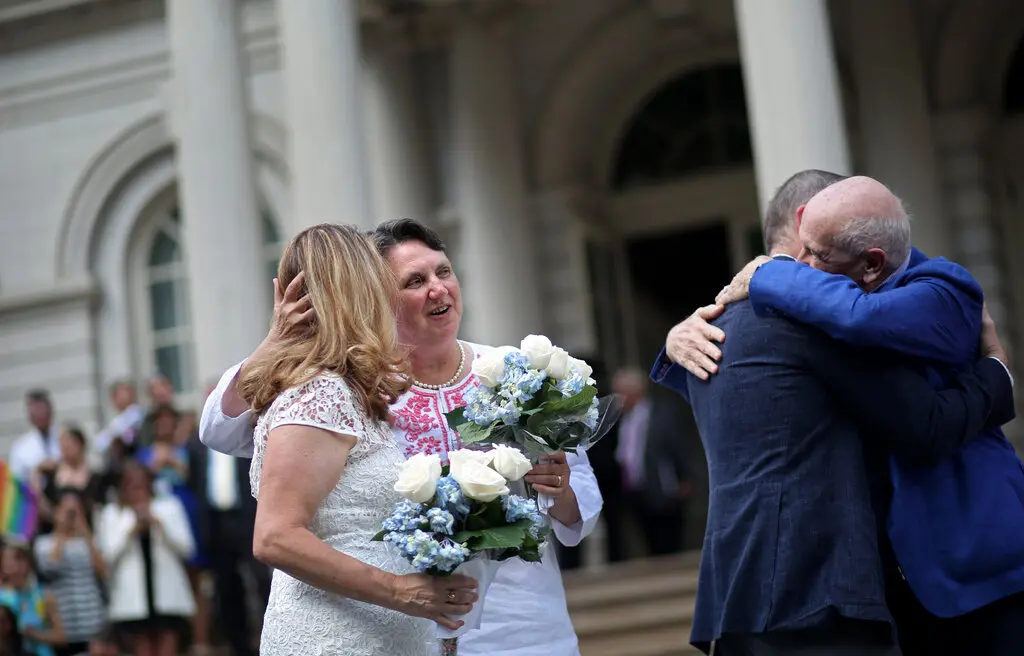Before the midterms, Blunt had publicly suggested lawmakers wait until after the elections to gain maximum GOP support.
“This bill is now designed to accomplish two things,” he said in a statement.
“People who are legally married in one state have the same protections and responsibilities in any other state that are offered to and required of marriages,” Burr added. “And, this legislation enhances the religious freedom for all Americans by protecting religious organizations from retaliation by federal agencies due to their views on marriage. I believe it’s better for Congress to clarify these issues than for federal judges to make these decisions.”
Sen. Richard Burr (R-N.C.) Burr, who is retiring in January, joined his fellow North Carolina Republican in supporting the legislation.
More than a decade ago, Burr voted to repeal Don’t Ask, Don’t Tell, although he previously voiced opposition to gay marriage.
Sen. Shelley Moore Capito (R-W.Va.) Capito previously argued the Supreme Court’s Obergefell v. Hodges 2015 landmark decision prohibiting same-sex marriage bans should have been left to the states.
In a statement supporting Wednesday’s bill, Capito echoed that criticism by saying the judiciary cannot be a policy-making entity, instead leaving decisions on same-sex marriage to lawmakers.
“This does not lessen the traditional sanctity of marriage or jeopardize the freedom of religious institutions,” Capito said of the bill.
“The House-passed legislation raised concerns among many about protecting religious freedoms, which is why my colleagues and I worked to strengthen those protections in the substitute amendment,” the statement continued. “I will be supporting the substitute amendment because it will ensure our religious freedoms are upheld and protected, one of the bedrocks of our democracy.”
Sen. Cynthia Lummis (R-Wyo.) In supporting the bill, Lummis cited the Wyoming Constitution, saying it enshrines equality for all of the state’s citizens, also referencing the legislation’s religious liberty protections.
“As a Christian and a conservative, ensuring that the religious liberties of people in Wyoming are protected and that no institution would be forced to perform a ceremony that is not in line with their values is absolutely essential,” Lummis said in a statement.
“Furthermore, this bill makes it clear that the tax-exempt status of non-profit religious organizations will not be impacted in any way,” she added. “Striking a balance that protects fundamental religious beliefs with individual liberties was the intent of our forefathers in the U.S. Constitution and I believe the Respect for Marriage Act reflects this balance.”
Sen. Lisa Murkowski (R-Alaska) Murkowski has long voiced support for same-sex marriage, arguing in a 2013 op-ed that the government should stay out of citizens’ private lives and not prohibit gay marriages.
“I have long supported marriage equality and believe all lawful marriages deserve respect,” Murkowski said in a statement on Wednesday.
“I thank my colleagues who improved the bill’s protections for religious liberty and continued prohibitions on polygamy, allowing it to move forward this week,” she continued. “All Americans deserve dignity, respect and equal protection under the law.”
Sen. Mitt Romney (R-Utah) Romney announced his support for the bill earlier on Wednesday, stressing the new version’s inclusion of religious liberty protections.
The announcement came after the Mormon church, which only endorses heterosexual marriages, announced its support for the bill. Romney is a longtime active member of the church.
“While I believe in traditional marriage, Obergefell is and has been the law of the land upon which LGBTQ individuals have relied,” Romney wrote in the statement. “This legislation provides certainty to many LGBTQ Americans, and it signals that Congress — and I — esteem and love all of our fellow Americans equally.”
Sen. Dan Sullivan (R-Alaska) When first running for the Senate, Sullivan voiced support for a constitutional amendment banning same-sex marriage.
His support comes after he previously was noncommittal about the bill.
Sen. Todd Young (R-Ind.) Young for months has been viewed as a potential GOP supporter of the bill.
In 2016, Young voted in support of an amendment that upheld former President Obama’s executive order banning discrimination based on sexual orientation or gender identity for federal contractors.
In September, Young said, “I’m consulting with my constituents about it.”
